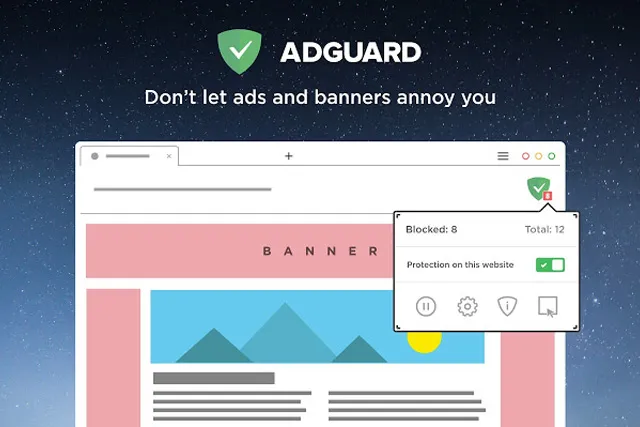If you’ve decided once and for all that you can’t stand another video pre-roll commercial, then it’s time to install an ad blocker. But which one? Don’t worry. We picked out the best ad blockers for what we believe to be the best web browser around, Google Chrome. Our top pick, AdBlock, does exactly what its name suggests, but it also allows you to customize which sites are allowed to show ads and which types of ads are shown.
But if AdBlock doesn’t quite meet all of your ad blocking needs, be sure to check out the other picks for Chrome ad blockers on this list.
However, it is worth noting that many of the world’s free websites, Digital Trends included, rely on advertising revenue to operate. If you want your favorite sites to continue working as you see them now, make sure to whitelist them.
AdBlock

As one of the most widely-used ad blockers in the world, we would be remiss if we didn’t at least give a passing mention to AdBlock. With its very on-the-nose name and long-running availability, it’s often what people turn to when they consider blocking adverts online today.
The AdBlock extension for Chrome works automatically, blocking ads on static web pages and online video sites like YouTube. It also lets you set up whitelists of sites and ad types to allow through the filter if you so choose. Through its filter list subscription system, you can customize your web browsing experience so that only ads you like are shown, or untick it all and block just about everything.
You can even have the app remove other webpage aspects you find distasteful, like social networking links, and protect yourself against some potential malware attacks.
AdBlock does participate in the “Acceptable Ads” initiative, so there are ads it allows through (if you choose) that meet certain requirements. AdBlock is also known to be a little resource heavy, especially if you like to have many tabs open at one time, and there have been some claims of it not blocking YouTube ads particularly well.
Finally, AdBlock receives regular updates that help the software keep up with all the latest internet ad delivery methods, which is always important for good ad-blocking programs. Overall, this makes it one of the best Google Chrome extensions around.
AdBlock Plus

AdBlock Plus is the original granddaddy app for blocking ads online, and it’s still just as popular today as it was when it first took the web by storm. Blocking technology takes out banner ads, video pre-roll ads, social networking ads, and pop-ups. It offers a comprehensive ad-blocking service to all who install its Chrome extension.
With an easy-to-navigate interface and customizable filter list, you can decide exactly which ads you want to see and which ones you never want to see again. Its whitelisting function lets you make sure your favorite sites still display ads so they can continue to operate. If you allow acceptable ads, you can let a few through automatically to help sites that stick to the rules.
Note that around five years ago, AdBlock Plus was accused of secretly offering to push ads through in exchange for under-the-table payments, which AdBlock Plus didn’t exactly deny. The organization appears to make unique deals with larger organizations that may let some extra ads through.
uBlock Origin

Entirely free and open source, uBlock Origin is a popular content blocker that can block ads and other scripts on Google Chrome. We include it here because it does a great job of blocking ads without taxing your system in the process.
Utilizing similar block lists to AdBlock Plus, uBlock offers comparable blocking capabilities. Still, by leveraging what style resources are required for individual web pages, it can be more efficient in its operation. Its specific ability to counter pesky pop-under ads has also been noted, which have become more common as more browsers come with their own pop-up blockers.
Users can also leverage uBlock’s own filters for ads, malware, and privacy concerns, as well as their own custom-created filters. Individual sites can be whitelisted by hitting the big power button inside the tool itself, and there are detailed stat breakdowns to let you know how effective a tool it has been since installation.
AdGuard

Another popular ad blocker for Chrome is AdGuard. Capable of effectively blocking almost all ads across static web pages, video streaming sites, and social networks, AdGuard keeps an eye out for pop-up and pop-under ads, too.
The lightweight Chrome extension has additional options for blocking tracking and installing nefarious software like dialers, adware, and other malware. One of its biggest claims to fame is its ability to speed up your web browsing experience and reduce your bandwidth by cutting back on all the needless clutter that comes with some ads and trackers.
Some users have reported annoying notifications that try to encourage you to purchase the premium version. Still, other than that, AdGuard has almost exclusively positive reviews from its millions of users.
Ghostery

Even though it functions a bit differently from many of the other ad blockers included in this list, Ghostery is still a helpful tool for personalizing your web browsing experience and making it just how you want it to be. Its main purpose is to block web trackers and analytics devices that collect information about you, but it also has its own powerful adblocker.
What truly attracts people to Ghostery over the many other available options is its more extensive choices for users. If you want to prevent particular trackers or ad types from accessing your information, you can. To make this simple, even for those brand-new to the idea, Ghostery breaks down each page you visit with thorough details of the kinds of trackers and ads being used by that specific site. You can then eliminate components at will or make more large-scale, sweeping blocks.
The only disadvantage of Ghostery is that you’ll have to put in the time and effort in explaining how you want it to work. While other ad blockers perform sufficiently altogether, if you try this approach with Ghostery, you might discover many features of the web non-functional. We suggest taking a little time to get it right, though, and Ghostery just might become your preferred tool for customizing your web browsing adventures.
If you’re concerned about how our browsing is tracked, you could sign up to one of the best VPNs. Alternatively, choose a privacy-focused browser.



